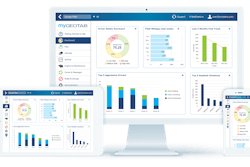While the work schedule of professional truck drivers varies, the sedentary nature of the job doesn’t – nor do the limited healthy food options on the road.
The demographics of the driver workforce are another health concern. Nearly 57% of all truckers are over the age of 45, and 23% are over 55. Nearly a quarter of the current trucking workforce is on track to hit retirement age within the next 10 years, and nearly 8% of truckers currently are already above retirement age.
A medical study conducted in 2014 found obesity and smoking were twice as prevalent in long-haul truckers as the general population. Both increase their risk of heart disease and diabetes. Sixty-one percent of drivers in the study reported having two or more of these risk factors: hypertension, obesity, smoking, high cholesterol, no physical activity, and six or fewer hours of sleep per 24-hour period.
Drivers are well aware of the toll of their career takes on their health. As part of CCJ's 2020 What Drivers Want survey, drivers listed heath as their No. 2 job concern (19%), next to “paying my bills each month” at 28%. Additionally, 7% of drivers said the thing they dislike most about their job is “driving has been bad for my health.”
The survey had 1,056 respondents, split between company drivers (82%) and leased owner-operators (18%).
Boosting corporate health programs
Given the concerns drivers have about their health, what can motor carriers do that will help create a healthier work lifestyle? Smartphones are nearly ubiquitous among truck drivers, and developers have created plenty of health apps for individuals and groups to track their progress towards fitness goals.
Some motor carriers have also installed their own apps on in-cab mobile platforms to give drivers a more convenient way to participate in corporate health and wellness programs.










